 Here is your click
Here is your click
 Here is your quiz
Romeo
Here is your quiz
Romeo
Mange, thinness, cat flu: old Romeo is in a very bad way!

 This campaign has failed... SOS dogs of Morocco hasn't received anything.
Why?
This campaign has failed... SOS dogs of Morocco hasn't received anything.
Why?
It is always a huge disappointment to see a campaign fail, it means that the concerned animals will not receive any help. Unfortunately, we can not ship incomplete campaigns.
We want to maximize the help we are all bringing to the animals in distress. Our campaign goals are calculated to balance our storage, delivery and manufacturing costs of the offered products.
Delivering failed campaigns would generate too many costs, which would eventually lead to the bankruptcy of the website and leave all the animals that we could have helped alone...
The delivery of unfinished campaigns is also physically impossible for some products (if only 50% of a kennel is financed: we can not cut it in half).
Our activity is regulated by the french tax law, it forbides us to transfer money instead of the advertised product (article L 548-1 of the Monetary and Financial Code).
For this reason, when a campaign fails, donations are immediately refunded. If they want to, donors can send this money directly to the association.
Our activity is regulated by the french tax law, it forbides us to use the money for anything else than the original use announced in the campaign (article L 548-1).
So, unfortunately, we are not allowed to transfer donations from a campaign to another.
Free clicks are saved before being reallocated to other campaigns (free clicks being immaterial, they are not submited to the same obligations than financial donations).
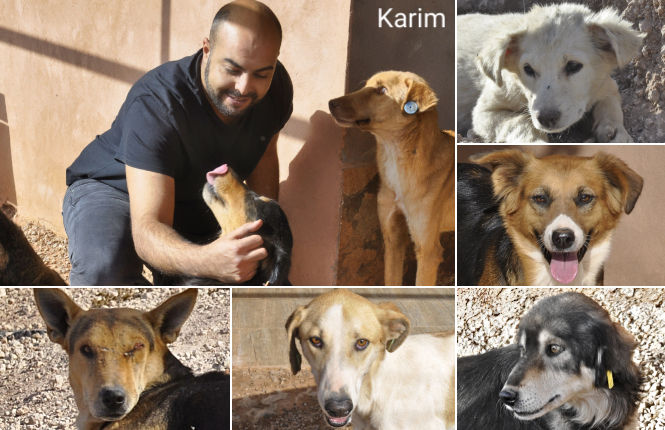
This campaign failed, it won't be delivered... Collected quantities have been cancelled (payments have been transfered back and free clicks have been saved in a stock).
0 kg
Dry food offered
2,300 kg
Dry food necessary
Participate in confidence
Animal Webaction visited the site 16 November 2024 and confirms the situation described below.
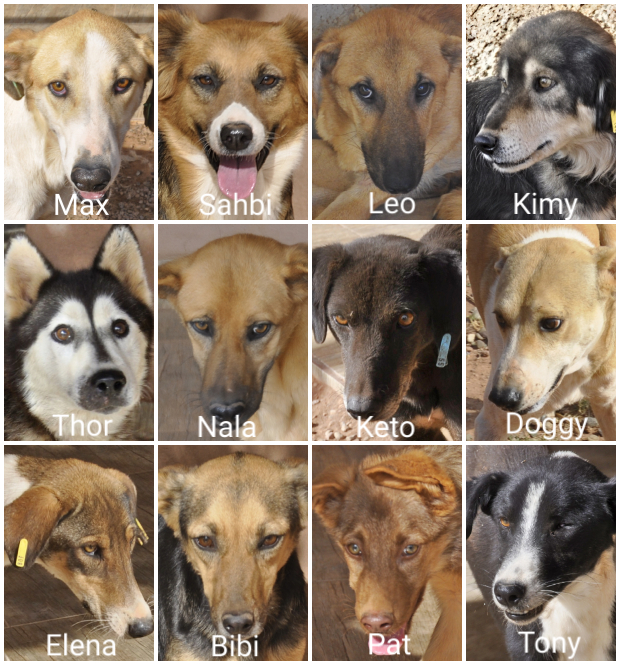
"Over the past few weeks, we’ve had to rescue many street dogs due to the roundups organized by the municipality. We took them in and brought them to the shelter, but most of them are in terrible condition: fractures, bruises, sprains… And of course, more dogs at the shelter mean more needs—more food, more medical care. Right now, we have barely fifteen bags of kibble left. That’s only enough for three or four days, no more!
We’ve already been rationing portions for a week, trying to stretch them out to make them last a bit longer. But it’s not enough. The dogs are hungry, and we can see the effects: some are getting sick, with more cases of diarrhea. And then there’s the aggression—it’s increasing. They fight over food; they’re just trying to survive. They’re starving; they just want to eat, that’s all...
We keep three to ten dogs per enclosure. We do our best to pair them well and anticipate conflicts, but hunger overwhelms everything. They’re at their breaking point. Honestly, what terrifies me the most is the thought that we might have to release some dogs back onto the streets just to prevent fights at the shelter... That would be unbearable."
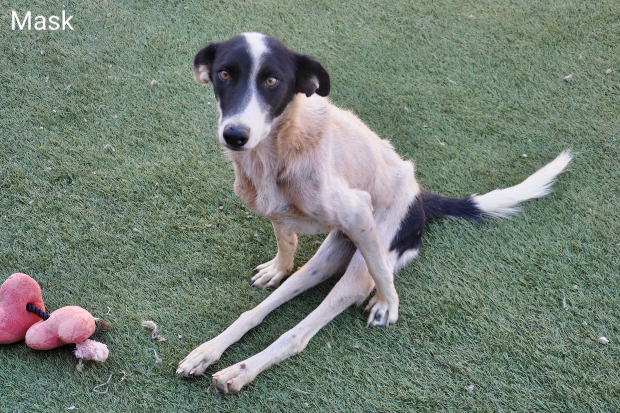
"Mask is a young dog who’s been with us at the shelter for two months now. We found him on the road to Tahanaout after he was hit by a vehicle. The impact was devastating—he’s paralyzed.
Unfortunately, he’ll probably remain paralyzed for life. We’re doing everything we can, trying to work on his rehabilitation in the hope of some improvement, but so far, there hasn’t been much progress. Right now, what he needs most is food, to regain strength and keep going. It’s vital for him."
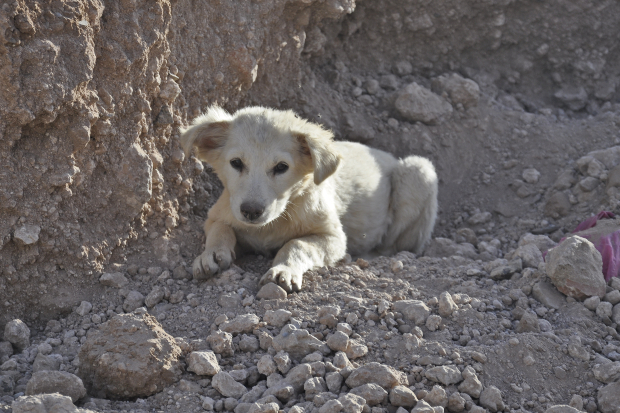
"We take care of about a hundred street dogs, and they’re also suffering from the kibble shortage. Every time we have to cut back on our distributions, their survival is at risk. They have no choice but to scavenge in the trash, which exposes them to parasites and diseases. And then there are the fights—for scraps of food or to steal from another dog, they become aggressive.
These fights leave marks: injuries to their ears, their eyes… It’s obvious. And when these dogs become a problem in their neighborhoods, the municipality steps in. Then it’s off to the pound… and we know what happens next. It’s a vicious cycle. From every angle, if we can’t feed them, these dogs are doomed!"
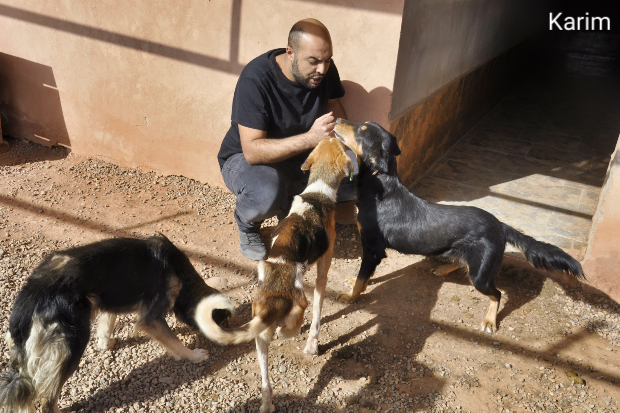
"Our financial situation has become catastrophic. We lost a major donor who used to cover 50% of our expenses. This loss has forced us to rethink everything. We’ve had to turn down rescues, postpone surgeries… We’ve also had to cut back on sterilizations. Everything is being scaled back.
Our debts are piling up—overdue bills with the kibble supplier, canned food, treats… It’s the same for antiparasitic treatments and anesthetics; we’re in the red. It’s so frustrating. When I first got involved, I thought food would be the easiest thing to secure. But no—it’s our biggest expense, and every month, we face the same anxiety, the same question: Will we be able to feed our dogs?
Without a stable food supply, we have no flexibility. We can’t plan long-term or launch sustainable programs. We’re always in crisis mode. Yet our goal is to focus on rescues, sterilizations, surgeries… But with an unstable supply chain, everything grinds to a halt. Morally, it’s exhausting. I have to keep going because these animals have no one else. But I’m worn out."
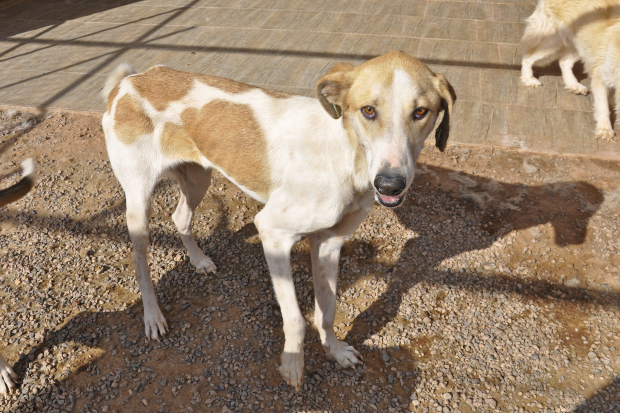
"What motivated me to get involved in animal protection was the condition of the animals here. In Morocco, you just have to walk down the street to see how urgent the situation is. You see stray cats ravaged by infections, injured dogs, animals hit by cars left with no help. It’s something you can’t ignore once you’ve seen it.
At first, I started by helping out with a local association. But very quickly, I realized I wanted to do more. That’s how "L'Arche de Noé" was born in 2015. Today, our actions are starting to make a real difference.
We rescue animals from the streets, raise awareness on social media and in the field. We care for the injured because here, there’s no emergency service for them. The solutions are brutal: either let them die or eliminate them. That’s why what we’re doing is so essential. Every day, we save lives that would have no chance without us."
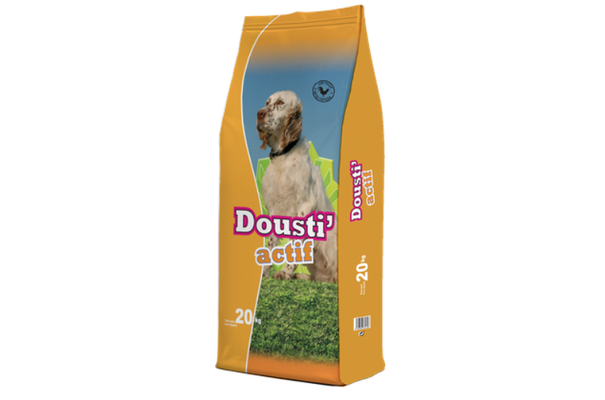
Animal Webaction has a logistic platform in Morocco, which allows us to intervene quickly and deliver kibbles.
When a campaign fails, Animal Webaction cannot deliver the products. The beneficiary doesn't receive anything and the buyers are refunded.
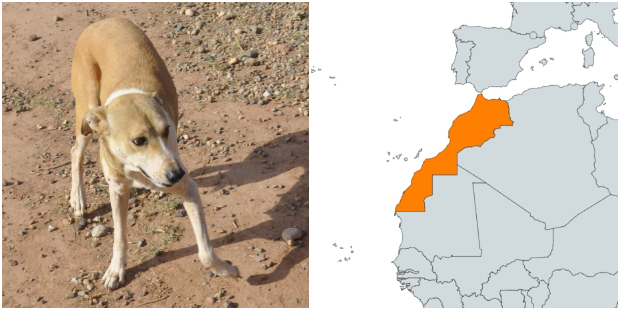
If you know of a foundation or NGO that could help Karim, please invite them to contact us so that we can put them in touch.
If you represent an animal protection foundation or NGO, please help Karim's dogs, contact us and we will put you in touch!
If you want to come to Karim's shelter or if you want to send them directly some kibbles or a check, contact him via Facebook (note: direct help is under your own responsibility).
|
|
|
|
|
Safe payment 100% safe payment via PayPal or credit card |
Verified action We've carried out checks on this action, Animal Webaction visited the shelter
|
Sending kibble The shelter won't receive any money, only the kibble bought on its behalf |
|
|
|
|
|
Delivery tracking We will keep you posted and you will receive delivery pictures |
Satisfied buyers Our satisfaction rate is 98% (read our +1000 Facebook reviews) |
Expertise Animal Webaction partners with 1000 animal welfare associations in 15 countries and has been existing for 13 years |
 Maroc
Maroc